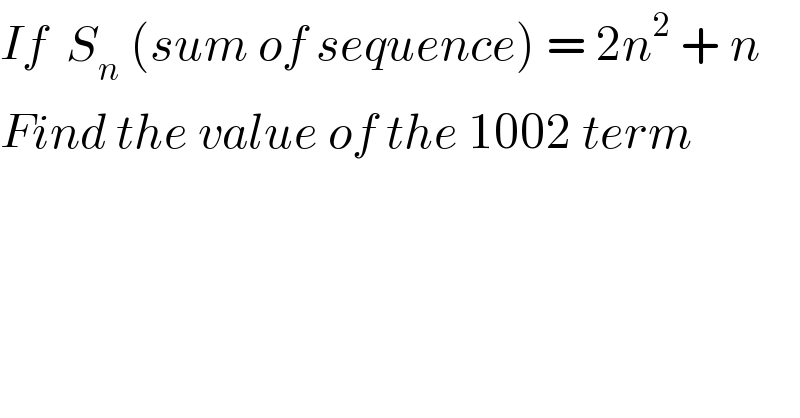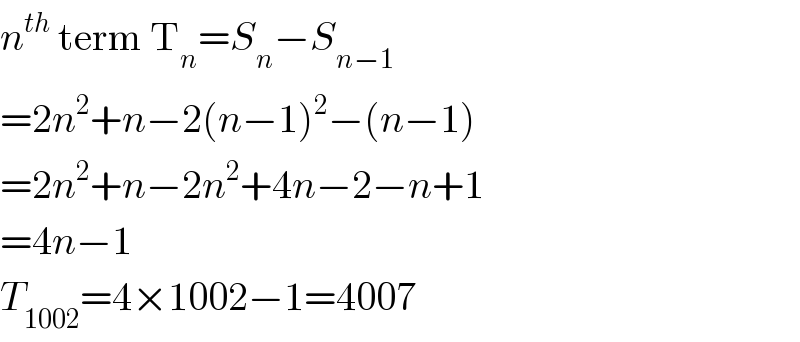
Question Number 7656 by Tawakalitu. last updated on 07/Sep/16

$${If}\:\:{S}_{{n}} \:\left({sum}\:{of}\:{sequence}\right)\:=\:\mathrm{2}{n}^{\mathrm{2}} \:+\:{n} \\ $$$${Find}\:{the}\:{value}\:{of}\:{the}\:\mathrm{1002}\:{term} \\ $$
Commented by prakash jain last updated on 12/Sep/16

$${n}^{{th}} \:\mathrm{term}\:\mathrm{T}_{{n}} ={S}_{{n}} −{S}_{{n}−\mathrm{1}} \\ $$$$=\mathrm{2}{n}^{\mathrm{2}} +{n}−\mathrm{2}\left({n}−\mathrm{1}\right)^{\mathrm{2}} −\left({n}−\mathrm{1}\right) \\ $$$$=\mathrm{2}{n}^{\mathrm{2}} +{n}−\mathrm{2}{n}^{\mathrm{2}} +\mathrm{4}{n}−\mathrm{2}−{n}+\mathrm{1} \\ $$$$=\mathrm{4}{n}−\mathrm{1} \\ $$$${T}_{\mathrm{1002}} =\mathrm{4}×\mathrm{1002}−\mathrm{1}=\mathrm{4007} \\ $$
Answered by Rasheed Soomro last updated on 09/Sep/16
![S_n =2n^2 +n t_(1002) =? Let a and d are first term and common difference of the AP. S_n =(n/2)[2a+(n−1)d] Let first determine sum of 2003 terms,which will help us to determine t_(1002) . S_(2003) =((2003)/2)[2a+(2003−1)d]=2(2003)^2 +2003 =[2a+2002d]=((2(2003)^2 +2003)/(2003))×2 2[a+1001d]=[2(2003)+1]×2 a+(1002−1)d=(([2(2003)+1]×2)/2)=4006+1=4007 t_(1002) =4007](Q7660.png)
$${S}_{{n}} =\mathrm{2}{n}^{\mathrm{2}} +{n} \\ $$$${t}_{\mathrm{1002}} =? \\ $$$${Let}\:{a}\:{and}\:{d}\:{are}\:{first}\:{term}\:\:{and}\:\:{common}\:{difference} \\ $$$${of}\:{the}\:{AP}. \\ $$$${S}_{{n}} =\frac{{n}}{\mathrm{2}}\left[\mathrm{2}{a}+\left({n}−\mathrm{1}\right){d}\right] \\ $$$${Let}\:{first}\:{determine}\:{sum}\:{of}\:\mathrm{2003}\:{terms},{which} \\ $$$${will}\:{help}\:{us}\:{to}\:{determine}\:\:{t}_{\mathrm{1002}} \:. \\ $$$${S}_{\mathrm{2003}} =\frac{\mathrm{2003}}{\mathrm{2}}\left[\mathrm{2}{a}+\left(\mathrm{2003}−\mathrm{1}\right){d}\right]=\mathrm{2}\left(\mathrm{2003}\right)^{\mathrm{2}} +\mathrm{2003} \\ $$$$\:\:\:\:\:\:\:\:\:\:=\left[\mathrm{2}{a}+\mathrm{2002}{d}\right]=\frac{\mathrm{2}\left(\mathrm{2003}\right)^{\mathrm{2}} +\mathrm{2003}}{\mathrm{2003}}×\mathrm{2} \\ $$$$\:\:\:\:\:\:\:\:\:\mathrm{2}\left[{a}+\mathrm{1001}{d}\right]=\left[\mathrm{2}\left(\mathrm{2003}\right)+\mathrm{1}\right]×\mathrm{2} \\ $$$$\:\:\:\:\:\:\:\:\:{a}+\left(\mathrm{1002}−\mathrm{1}\right){d}=\frac{\left[\mathrm{2}\left(\mathrm{2003}\right)+\mathrm{1}\right]×\mathrm{2}}{\mathrm{2}}=\mathrm{4006}+\mathrm{1}=\mathrm{4007} \\ $$$$\:\:\:\:\:\:\:\:{t}_{\mathrm{1002}} =\mathrm{4007} \\ $$
Commented by Tawakalitu. last updated on 09/Sep/16

$${Thanks}\:{but}\:{they}\:{wrote}\:\mathrm{4007}\:{here}\:{as}\:{answer}.\:{maybe}\:{they}\:{are}\:{wrong} \\ $$$${thanks}\:{sir}. \\ $$
Commented by Rasheed Soomro last updated on 09/Sep/16

$${They}\:{are}\:{right}.\:{There}\:{was}\:{a}\:{mistake}\:{in}\:{my}\:{answer}. \\ $$$${I}\:{had}\:{multiplied}\:{by}\:\mathrm{2}\:{instead}\:{of}\:{divided}\:{in}\:{last}\:{two}\:{steps}. \\ $$$${I}\:{have}\:{corrected}\:{it}\:{now}.\:{Sorry}\:{for}\:{mistake}! \\ $$
Commented by Tawakalitu. last updated on 11/Sep/16

$${Thanks}\:{so}\:{much}.\:{i}\:{really}\:{appreciate}. \\ $$
Commented by Tawakalitu. last updated on 11/Sep/16

$${Thanks}\:{so}\:{much}.\:{i}\:{really}\:{appreciate}. \\ $$
